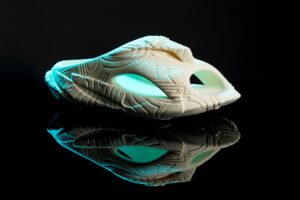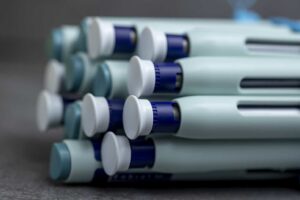The saga of
Biogen’s
Aduhelm, the Alzheimer’s disease drug that was once the most talked-about pharmaceutical in the industry, ended with a thud on Wednesday morning.
Biogen announced it would stop its efforts to develop and sell Aduhelm, and would return all rights to Neurimmune, the company from which it licensed the drug in 2007.
The Aduhelm commercial program had been all but dead since 2022, when the Centers for Medicare & Medicaid Services (CMS) declined to offer Medicare coverage for the drug. Biogen had been continuing to run a clinical trial of Aduhelm, however, as a condition of the Food and Drug Administration’s accelerated approval of the drug in mid-2021. Biogen will now terminate that trial.
The company and its partner
Eisai,
along with the rest of the field of Alzheimer’s treatment, have moved past Aduhelm. Eisai and Biogen received FDA approval for a more effective Alzheimer’s treatment, Leqembi, early last year.
The shadow of Aduhelm, however, lingers over Biogen. When the drug received its surprising FDA approval in mid-2021, it seemed a signal moment for treatment of Alzheimer’s disease—and for the biopharma industry at large.
The stock spiked to nearly $400 per share after the Aduhelm approval, then collapsed amid questions about its efficacy and its price. Biogen shares dropped below $200 until positive data on Leqembi arrived in late 2022. Shares are now in the $250 range, and the stock is down 25% over the past five years.
The Aduhelm approval set off an enormous controversy in mid-2021. Evidence supporting the drug’s efficacy was very thin, and experts had anticipated that the agency would toss Biogen’s request for approval.
Instead, the FDA gave Aduhelm accelerated approval, a pathway that at the time had generally been reserved for cancer drugs that had not yet proven their clinical effectiveness. The FDA ignored the advice of an advisory panel that had recommended against approving the drug, leading multiple members of the panel to resign.
Aduhelm’s initial cost of $56,000 a year shocked observers and led the CMS to sharply increase premiums for the Medicare prescription drug benefit in 2022. Months later, in early 2022, the CMS said that it wouldn’t pay for Aduhelm, derailing Biogen’s plans. Data in late 2022 that appeared to showed that Leqembi worked much better than Aduhelm largely ended interest in the latter treatment.
While Biogen and Eisai collaborated on both Aduhelm and Leqembi, Biogen was the lead partner on Aduhelm, while Eisai is the lead on Leqembi. In its statement Wednesday, Biogen said it would continue to work on Leqembi and would “accelerate development” of other Alzheimer’s drugs in its pipeline.
Biogen said that it had failed to find any external partners interested in Aduhelm. It said it had recorded a one-time charge of $60 million related to the termination.
“This decision is not related to any safety or efficacy concerns,” the company said in a statement. “A large portion of the resources released resulting from termination of the Aduhelm program will be redeployed in Biogen’s Alzheimer’s disease franchise.
Write to Josh Nathan-Kazis at josh.nathan-kazis@barrons.com and Emily Dattilo at emily.dattilo@dowjones.com
Read the full article here












